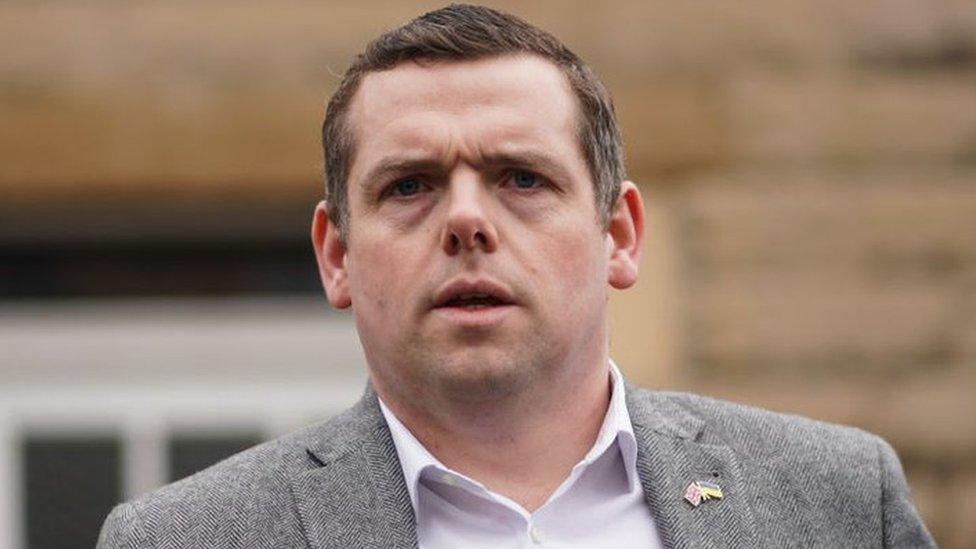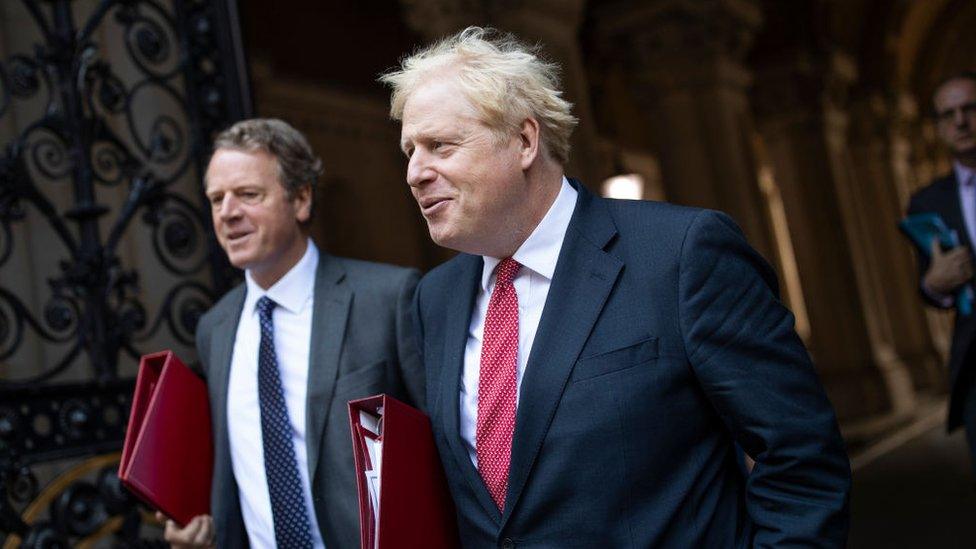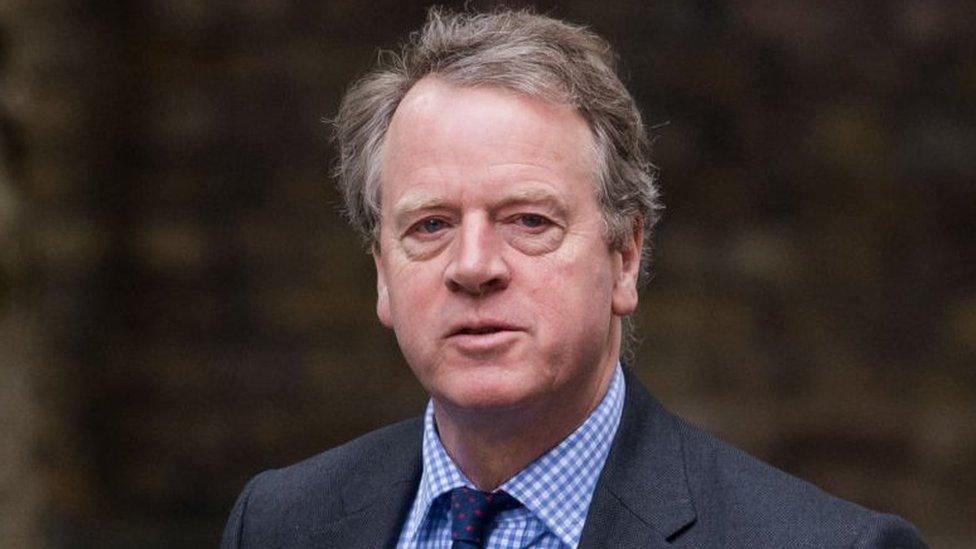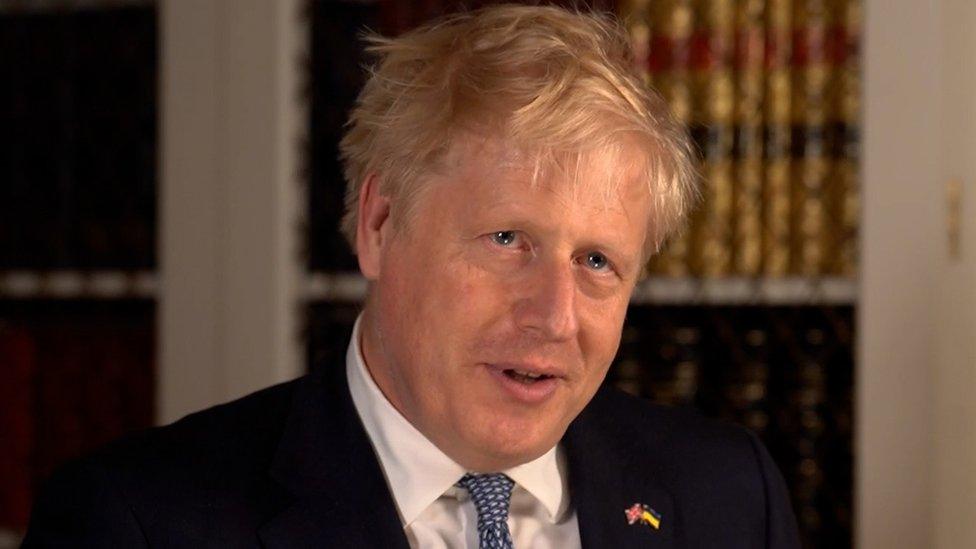Where does the U-turn journey end for Douglas Ross?
- Published

Douglas Ross has performed two U-turns over Boris Johnson's premiership
Boris Johnson was never Douglas Ross's first choice to be UK Conservative leader but he did back him in the 2019 contest to replace Theresa May.
He has not said whether he now regrets that decision but he has certainly changed his mind about him. More than once.
In January, Mr Ross withdrew his support for Boris Johnson saying his position had become "untenable" over lockdown parties and calling for a confidence vote.
He then reversed that position when the war in Ukraine started, arguing that political upheaval at home would play into the hands of Vladimir Putin.
That no longer seems to be of primary concern, Mr Ross having now completed a double U-turn by voting for the motion of no confidence in Boris Johnson's leadership.
In a statement, he said that while the timing of the vote was not ideal, he had listened to public anger over Partygate and could not in "good faith" continue to back the PM.
That decision brings him into line with the bulk of his Tory colleagues at Holyrood, but his numerous changes in position have raised questions about his own leadership capabilities.
As one pro-Johnson MP put it, he would be reluctant to be driven anywhere by Douglas Ross for fear of not knowing where the journey might end!
The reality is that, given his flip-flopping form, the Scottish Tory leader would have faced criticism and embarrassment whichever way he'd voted.
Either for backing a law-breaking PM that the Scottish party has blamed for heavy losses in the recent local elections or - as it turns out - for abandoning him despite having insisted he should continue to lead the UK through the Ukraine crisis.
Mr Ross was one of the 148 Tory MPs who expressed no confidence and among four of the six Tories with Westminster seats in Scotland to take that position.
The Scottish rebels are fairly unusual in that they have all publicly declared how they voted in what was a secret ballot.

Alister Jack continues to stand behind Boris Johnson
The MP John Lamont quit as an aide to the foreign secretary, Liz Truss, after he cast his vote against the PM.
It's not clear if former Scottish Secretary David Mundell (who was dumped from Cabinet by Mr Johnson) will be able to continue as a trade envoy to New Zealand after his rebellion.
MP Andrew Bowie - the fourth Scottish Tory MP refusing to back the PM - stepped down from his role as a vice-chair of the UK Conservative party some time ago.
This rift between MPs and their leader is not sustainable. It's hard to imagine, for example, a UK general election campaign with key Scottish Tories unable to endorse their own candidate for Number 10.
On the other side of the argument - still standing by their leader - MPs David Duguid and Alister Jack, who sits in Cabinet as Scottish secretary.
In a statement, Mr Jack said the PM's 211 votes represented a "clear majority" and that it was time to move on from Partygate and "get on with what really matters".
That may be wishful thinking on his part because having won the vote, Boris Johnson has also publicly lost the confidence of two fifths of his own MPs.
That's a worse result than his predecessor Theresa May got and she was forced to resign six months later.
It's not certain Boris Johnson will suffer the same fate, but nor is it certain that he will be able to govern effectively in the months ahead.
Reset policy
The trouble with rebellion is it can be habit-forming and if only a few dozen Tory MPs switch sides in certain Commons votes, the government loses. Even the threat of that could divert ministers from their course.
There is the potential for further trouble in Conservative ranks if the party suffers defeat in the forthcoming by-elections in Wakefield and in Tiverton and Honiton - which certainly look difficult for the Tories.
A privileges committee inquiry examining whether or not Boris Johnson knowingly misled parliament over Partygate is another potential flashpoint.
That does not mean the PM - protected as he is from another confidence vote for a year - is without agency. He has the power to reset policy in an effort to renew his appeal to Tory MPs and the wider public.
He is expected to bring forward new measures to cut childcare costs and help more people onto the housing ladder in the coming days.
Some have speculated that raising the prospect of an early general election might help him concentrate minds.
It is to his advantage that his critics currently lack an obvious candidate to replace him as Tory leader and PM.
Having won the confidence vote, Boris Johnson's premiership continues but with reduced authority which, as previous prime ministers have found, is not easy to regain.
- Published7 June 2022

- Published6 June 2022
